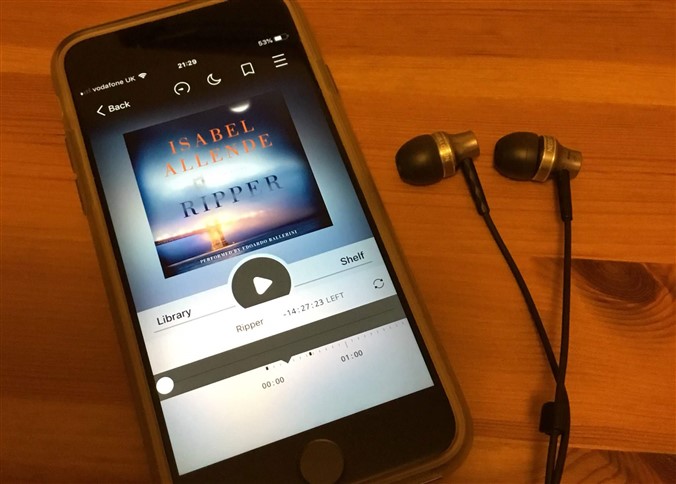Audiobooks are changing the way I, and many other book lovers, consume fiction. They’ve also made me rethink the way I write my own stories.
It’s five weeks now since I listened to my first audiobook. That doesn’t exactly qualify me as an early adopter. But I’ve more than made up for this late start by listening to more than 60 hours of audiobook fiction. Now I’m a total convert.

Audiobooks have been around since the invention of the phonograph. Not that they would have been easy listening then. The wax cylinders in use at the time could store only three or four minutes of sound recording. Ample for flash fiction. But a full novel would have required an entire wheelbarrow of cylinders.
It’s hardly surprising then that audiobooks didn’t take off. The real step-change has come with the rise of the smartphone. Spending on the audiobook format has more than doubled in the last five years. In 2017 the jump was more than 20% on the previous year. [guardian article link]
My own journey into audiobooks comes courtesy of my local library which offers audiobooks from two suppliers, Overdrive and BorrowBox. I use Overdrive and listen to the audiobooks on my phone through Overdrive’s Libby app.
The Libby user experience so far has been great. Browsing for books is easy, as is borrowing and placing holds. You can read ebooks or listen to audiobooks on the same app. One point to note: unless you have a generous data plan, you’ll need to use a WiFi connection at the borrowing stage. An audiobook requires a download of about 300MB.
In five weeks I’ve listened to 6 novels. That’s more than 60 hours of fiction I wouldn’t otherwise have found time for. Most of that listening has been done on the journey to and from work or at lunchtime. Which is the first big plus in favour of audiobooks. You can listen to them while doing almost anything else. All you need is your phone and headphones.
I have to admit it took me a little time at first to get used to a voice other than my own telling me a story. That feeling quickly passed and I like the fact that I don’t have to rely on my sometimes tired eyes to take a story in.
There’s also a directness to audio that connects me to the story in a different way to reading. Researchers at UCL have explored this in recent studies. Their work compared audiobooks to watching film versions of the same story. The study found that there is a greater emotional connection in audiobooks. In my opinion, the same is true when you compare audiobooks to reading a book.
And this is where audiobooks are helping me to rethink my own writing. All the advice I’ve read says you should read your own story aloud when you’re editing it. I’ve done that with all of my books. But listening to the stories of other authors has brought new insights. The stories that work best in audiobook format have a strong narrative momentum. They use clear, direct language and have an unfussy style. And what works in an audiobook is bound to work in print.
Audiobooks are now are regular part of my reading life. And the more I listen to them, the more impact they’ll have on my own writing